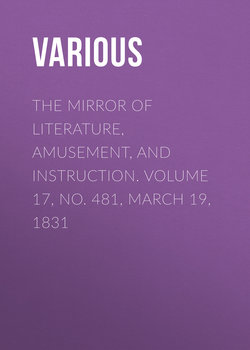The Mirror of Literature, Amusement, and Instruction. Volume 17, No. 481, March 19, 1831

Реклама. ООО «ЛитРес», ИНН: 7719571260.
Оглавление
Various. The Mirror of Literature, Amusement, and Instruction. Volume 17, No. 481, March 19, 1831
RELICS OF ARIOSTO
FANNY
THE "HALCYON" BIRD
HOUSE OF COMMONS
THE LEGACY OF THE SWORD
SPIRIT OF THE PUBLIC JOURNALS
MAVROVITCH, THE POLE
THE TOPOGRAPHER
MONMOUTHSHIRE
THE SELECTOR; AND LITERARY NOTICES OF NEW WORKS
THE SUNDAY LIBRARY
VENETIAN HISTORY
MANNERS & CUSTOMS OF ALL NATIONS
CAMBRIAN SUPERSTITIONS
THE GATHERER
THE REFORM BILL
EPITAPH
PATRIOTISM
SILK MANUFACTURE
INN RHYMES
ROYAL FAVOUR
Отрывок из книги
We need not bespeak the reader's interest in these "trivial fond" relics—these consecrated memorials—of one of the most celebrated poets of Italy. They are preserved with reverential care at Ferrara, the poet's favourite residence, though not his birthplace. The Ferrarese, however, claim him "exclusively as their own" Lord Byron, in the Notes1 to Childe Harold, canto 4, says, "the author of the Orlando is jealously claimed as the Homer, not of Italy, but Ferrara. The mother of Ariosto was of Reggio, and the house in which he was born is carefully distinguished by a tablet with these words:—'Qui nacque Ludovico Ariosto il giorno 8 di Settembre dell' anno 1474.' But the Ferrarese make light of the accident by which their poet was born abroad, and claim him exclusively for their own. They possess his bones, they show his ARM-CHAIR, and his INKSTAND, and his autographs. The house where he lived, the room where he died, are designated by his own replaced memorial, and by a recent inscription."
Ferrara, we should here mention, is a fortified town, and a day's journey, en voiturier, from Florence to Vienna. The Tomb, as well as the above relics, a bronze Medallion of the great Poet, and an account of his last illness and death—the two latter found in his tomb—are in the public library at Ferrara. This library also contains the original MSS. of Tasso's Gerusalemme Liberata, and Guarini's Pastor Fido; and in the Hospital of St. Anne, at Ferrara, travellers are shown the cell where Tasso was confined.
.....
"On his return he established himself, with his two unmarried sisters, in the house he had built near the church of Saint Benedict, and resumed his former occupations. Of his lighter amusements, gardening was that in which he took most pleasure; and it is curious to know that he was as fond of altering the plan of both his house and grounds, as he was of remodelling the stanzas of the Orlando. His son, Virginio proposed writing an account of his illustrious father's life; but unfortunately, he never pursued his design beyond the commencement, and a few memorandums are all that have come down to us. From these, however, we learn the singular fastidiousness of Ariosto in his horticultural amusements, and some other traits of his character, which render him not the less an object of our veneration, by showing us the simplicity as well as power of his mind. 'In gardening,' says Virginio, 'he pursued the same plan as with his verses, never leaving any thing he had planted more than three months in the same place: and, if he set a fruit-tree, or sowed seed of any kind, he would go so often to examine it, and see if it were growing, that he generally ended with spoiling or breaking off the bud.'
"We learn, from the same interesting document, that he had at first no intention of building a house for constant residence in this garden, but that, having raised a mere cottage for temporary shelter, he grew so fond of the spot, that he wished never to leave it. The structure, after all, was not fully suited to his taste, and he felt as great an inclination to improve it by continual alterations as his garden. His constant lamentation was, that he could not change the arrangement of his house as he could that of his verses: and a person having asked him one day, how it happened that he who could describe castles and palaces so magnificently, had built such a cottage, he replied, that he made his verses without the aid of money.
.....